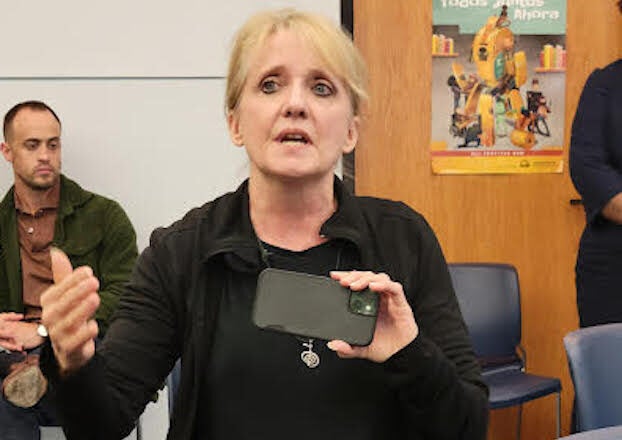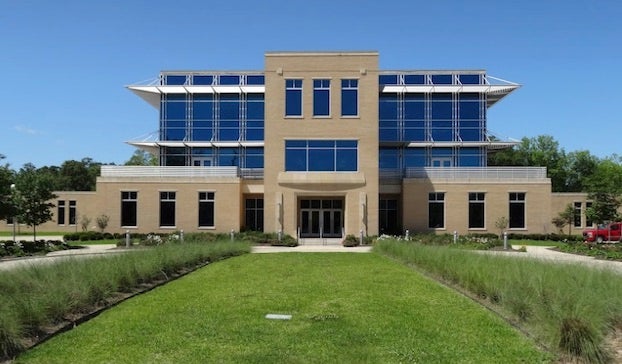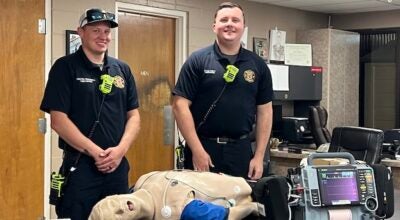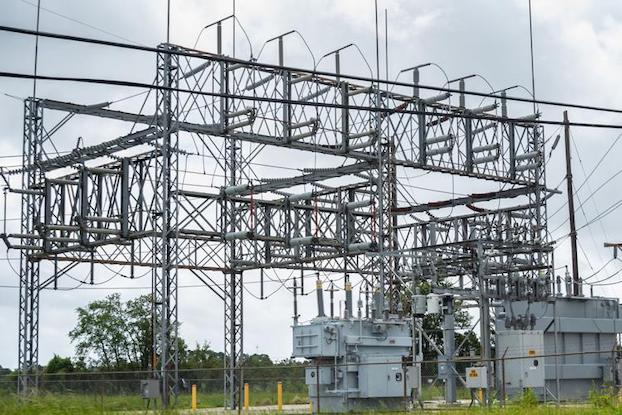Industry reps, environmental leaders, residents gather to learn about FERC
Published 10:23 am Thursday, March 7, 2024

- Lori Cook with the Louisiana Bucket Brigade asks questions Wednesday during the Community Connections meeting facilitated by the Federal Energy Regulatory Commission Office of Participation at the Sulphur library. (Rita LeBleu / American Press)
Local industry representatives, a few environmental justice group leaders and at least one landowner with pipelines crossing his land showed up at the Sulphur Library Wednesday. The 20-plus people were there to learn about the Federal Energy Regulatory Commission (FERC), and how to provide input on natural gas pipelines and Liquefied Natural Gas (LNG) export facility proposals. The same type of meeting would be held in Lake Charles later that day.
Projects and matters currently under FERC review were off the table for discussion. “Nothing said at this meeting should be considered as advice,” noted Vincente Carreon, FERC Office of Public Participation (OPP).
FERC is an independent federal agency that regulates aspects of energy. Its five commissioners are appointed by the president with the advice and consent of the Senate. FERC develops regulations under federal laws such as the Federal Power Act, the Natural Gas Act, Interstate Commerce Act and other laws passed by Congress. Although FERC has regulatory responsibilities for the U.S. energy industry, other federal agencies, state public utility commissions and tribal authorities also regulate different areas of the industry.
Pamela Young, FERC OPP, called the information presented in Sulphur, “a snippet.” She was there to “support, empower and promote public voices,” and to an extent, find out how the OPP staff, formed in 2021, could do its job better.
“After this meeting, if you have a ‘what if’ question, call us,” she said. “If you have a ‘can I do’ question, call us. You don’t know ‘til you ask.”
People may call FERC OPP to find out about docket numbers, timelines and how to navigate the website. In addition to increasing access to information, FERC OPP’s mission is to help restore trust in government regulators.
Charlie Atherton’s 40 acres in Calcasieu Parish has three pipelines crossing it. He said he was there to learn the FERC rules under which pipeline companies operate. Some of his comments, based on experience, could be helpful to others. He generally tailors contracts.
“They know the rules of the game,” Atherton said about the pipeline companies “The landowners do not. What we’re interested in is knowing the same things they know.”
Atherton had been granted a parish permit to build something on his land. The pipeline prevented the project going forward.
“They have to negotiate in good faith to make you whole,” he said. “How about a list for engaging in good faith? You’re not going to find that in writing anywhere that the landowner is aware of.” Atherton has submitted comments to FERC in the past and his experience in working with the regulatory agency has always been good.
Intercommunication between FERC and other regulatory offices might not be so good. When it comes to knowing what the Department of Energy and other agencies do compared to what FERC does, the lines can get fuzzy. Plus, each state regulates its own ambient air quality standards.
Travis Dardar heads up FISH, Fisherman Interested in Saving Our Heritage. He suggested a schematic with a hierarchy chart – what this group does and who it answers to, what it can help with and can’t. He wants to see a more streamlined communications approach for people who want to make a difference in their communities and have only so much time after work and other obligations.
Young said a good place to begin for those wishing to make comments for or against future projects is the FERC.gov website.
“It provides information on jurisdictional aspects and where to go for a particular project you want to find out about,” she said. The Office of Participation-FERC also has a social media page.
“Register with our e-library and e-subscription web pages for docket numbers and timelines,” she advised. “Or call us, that may be the quickest way. When the caller reaches the OPP office, they can tell the person on the line their name and the name of the project that they have heard is coming to their community. The phone number is (202) 5026595.Tutorials are also available on the website.
“I think participation is awesome,” said Lori Cook, Louisiana Bucket Brigade. “We can have a goal of participation, but to me, the ultimate goal of participation is influence. We kind of feel like there are a whole lot of people with a whole lot of different agencies that could not spot us on a map with a gun to their head.”
“That’s what we’re doing here,” Kelley Muñoz, OPP, said. She assured Cook and those who remained through the entire meeting that the FERC chairman and commissioners, the ones who have the final vote, are behind the FERC OPP efforts. “We are non-decisional but our experiences have led us to be able to guide you to say, here’s why it’s important to comment and here’s how you comment. She recommended concise comments that contain the following information: I live in this area and this is how this is affecting me. Don’t haphazardly throw comments on the docket. Somebody is listening, she said, with emphasis on the “is.”





